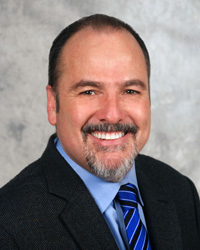Feature Story
Health Center Today, December 18, 2009
Two UConn Faculty Elected Fellows of AAAS
By Nan Cooper and Carolyn Pennington

Leo Lefrançois, professor of immunology, has been elected as Fellow to the American Association for the Advancement of Sciences.
Photo by Janine Gelineau
Two UConn faculty members have been elected as Fellows of the American Association for the Advancement of Science (AAAS): Leo Lefrançois, a professor of immunology, and Sanguthevar Rajasekaran, a professor of computer science and engineering.
Fellows are elected by their peers in recognition of their scientific contributions. The two will be formally inducted during the AAAS annual meeting in February 2010.
AAAS is an international non-profit organization dedicated to advancing science around the world. Its activities include publication of the journal Science, as well as educational and policy initiatives.
Leo Lefrançois, professor of immunology and director of both the Center for Integrated Immunology and Vaccine Research and the Flow Cytometry Facility at the Health Center, was recognized for his distinguished contributions to the understanding of T cell memory responses, trafficking, and development.
T cells, also known as T lymphocytes, are cells that are instrumental in the development and function of the body’s immune system. Lefrançois' lab studies the immune response to infection and in particular is interested in how long-term immunological memory is generated and maintained, since producing memory is a goal for successful vaccination.
Lefrançois' lab has published a number of pioneering studies, including one in which laser scanning microscopy was used to reveal for the first time the anatomy of an ongoing immune response to infection. Lefrançois' findings could ultimately be used to help develop better therapies for enhancing the fight against infection, or for blocking the response in autoimmune disorders.
Lefrançois has published more than 130 research and review articles and is an elected member of the Connecticut Academy of Science and Engineering. He is an advisory board member of the Journal of Experimental Medicine and Councilor, Society for Mucosal Immunology Board of Directors.
Sanguthevar Rajasekaran, the UTC Chair Professor of Computer Science & Engineering, was recognized for distinguished contributions to the fields of applied algorithms, randomized computing, parallel computing, and bioinformatics.
Rajasekaran’s work on packet routing is considered seminal, and his studies in integer sorting have helped pioneer new methodologies. He developed a novel web system for motif searching called Minimotif Miner, which is used by biologists worldwide.
His research has spanned a spectrum of applications, including motif search, natural language parsing, large scale modeling and simulations, data mining (identifying patterns and useful information from seemingly unrelated voluminous data), biological sequence analysis, mobile computing, image processing, computational geometry, model checking, learning theory, and message routing in the Internet.
Rajasekaran is a co-author of two textbooks, Computer Algorithms/C++ (1997) and Computer Algorithms (1998), the subject area editor of the Journal of Parallel and Distributed Computing, area editor of Parallel Processing Letters, and founder of the International Conference on Bioinformatics and Computational Biology (BICoB). He has published more than 200 research articles.
Rajasekaran holds nine U.S. patents, is an elected member of the Connecticut Academy of Science and Engineering, and is an IEEE Fellow.


